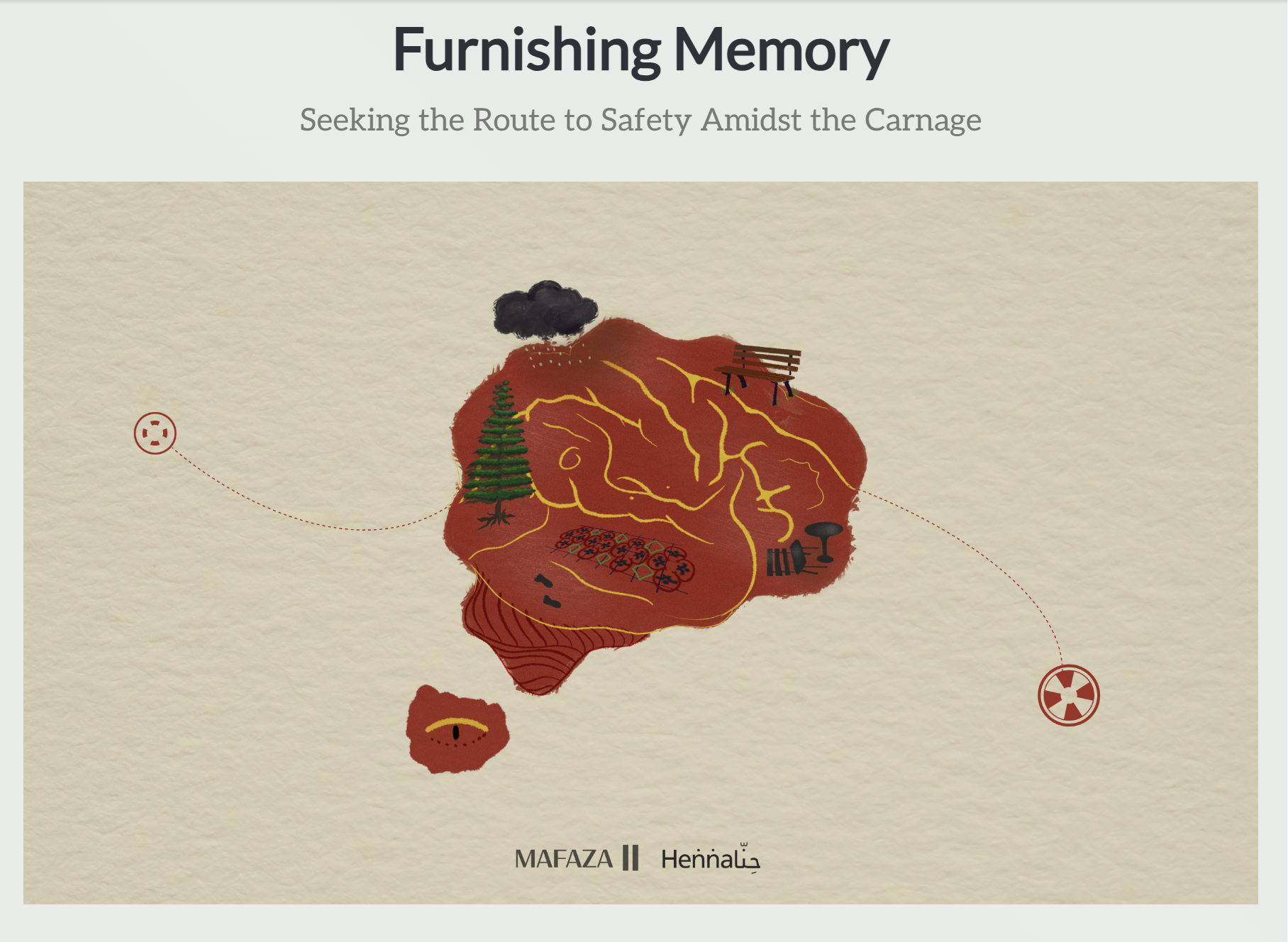A few months ago, I had the honor of contributing to Mafaza Digital Magazine, an initiative by Henna Platform exploring the theme of survival within Canada’s immigrant communities—a theme that resonates deeply and universally. Alongside ten other writers and two talented designers, I shared my experience and introduced “furnishing memory,” a concept I use to bridge the gap between the memories of past times and places and the present reality we inhabit.
Since my arrival in Toronto a year and a half ago, my life with my partner has undergone constant change. We’ve faced challenges and triumphs: completing three documentaries, establishing a company, and building a network of friends and collaborators. Yet, the theme of survival continues to shape our lives, influencing how we move forward and find joy amidst hardship. I invite you to read the full article on Henna Platform and to explore more thought-provoking articles from other contributors.

Mafaza Digital Zine, which you can explore here, is a rich digital space where diverse voices reflect on resilience, memory, and survival, aiming to build empathy and understanding through storytelling.
below is an excerpt of the article
The theme of survival
Let me be clear here at the outset: I do not think we survived. I don’t think that those who came out of the killing fields of Palestine and Syria, or the slow and daily deaths of Lebanon, I don’t think they are survivors. Even having made it to the safety of Canadian shores, so long as the killing machine runs amok in our lands, we have not survived. In the shelters of the mind formed by cruel experiences, and in between the folds of dark and difficult memories, we have space to work on our inevitable survival. I will soon turn to “furnishing memory” as the only type of action that can be carried out by those facing the threats and dangers of the survivor’s journey. I take the concept of memory as the condition/space that has influence over the world in which we live and interact.
We live in Canada today, but our minds judge life here with the tools, the consciousness, and the emotions of the past that we brought with us from our countries. Brimming with strong feelings and organic, emotionally loaded connections to other places, this past either compels us to make comparisons and to search the space of memory for the tranquility of a refuge, or it pushes us into isolation and separation. I suggest that we write the story of our survival by retrieving memory, reconstructing it, and mixing it in with what we are experiencing now, not by isolating it or bypassing it. I propose the idea of “furnishing memory,” by which I mean: by understanding how we recall the past and linking it to the place that inhabits the memory, we can reconfigure our memory, arrange it emotionally, and then furnish it with new experiences that link past experiences to current reality and use imagination to create the future.
Building on Gaston Bachelard’s argument that spaces can serve as havens of memory, where we define places by our familiarity with them and the extent to which we experience them, I argue that the act of “furnishing” memory with our experiences and their details is a way of creating a stable and secure place in an unstable insecure world. This journey is not only about reexamining memory but also about the intentional act of furnishing and reshaping it to house the continuity of life and culture amid turmoil and displacement. This can be considered a survival mechanism, as we find foundation and continuity in the spaces familiar to memory. We constantly construct and reconstruct our intimate spaces in our minds. This process is not only about preserving the past but also about reimagining and reinterpreting it, allowing individuals to adapt to new circumstances and maintain a sense of continuity and identity. Memory is not necessarily romantic, nor does it work in a unidirectional manner towards the past. Rather, it deals with pain through a dialectic of the past, the present, and the possibilities of the future.
Mafaza Digital Zine brings together a collective of powerful voices, each uniquely exploring survival and resilience in the face of adversity. Contributors include:
Introducing Mafaza Digital Zine
Mosab Alnomire – A Multilayered Portrait of Survival
The Governance of Hope
Hsain al-Shihabi – The Psychology Behind New Reality Building
Apocalypse in the Body
Kinana Issa – How to Survive After War and Oppression…
The Republic of Wounded Bodies
Nabil Muhammad – A Tale of Refugees Awaiting Artificial Limbs
Furnishing Memory
Ali Zaraket – Seeking the Route to Safety Amidst the…
To Fall From Nowhere
Nour Mousa – The Dilemma of the Palestinian Identity in…
Identity Survival in The Diaspora
Ola Barqawi – On The Challenges and Privileges of Layered…
The World is Not a Small Village
Raja Salim – Reflection on Distance and Survival
Living Wounds: Violation and Victimhood
Sasha Zack – Can We Survive Without Connecting With the…
To Be Understood Without Talking
Shaunt Raffi – Navigating Identity and Justice in the Armenian…

